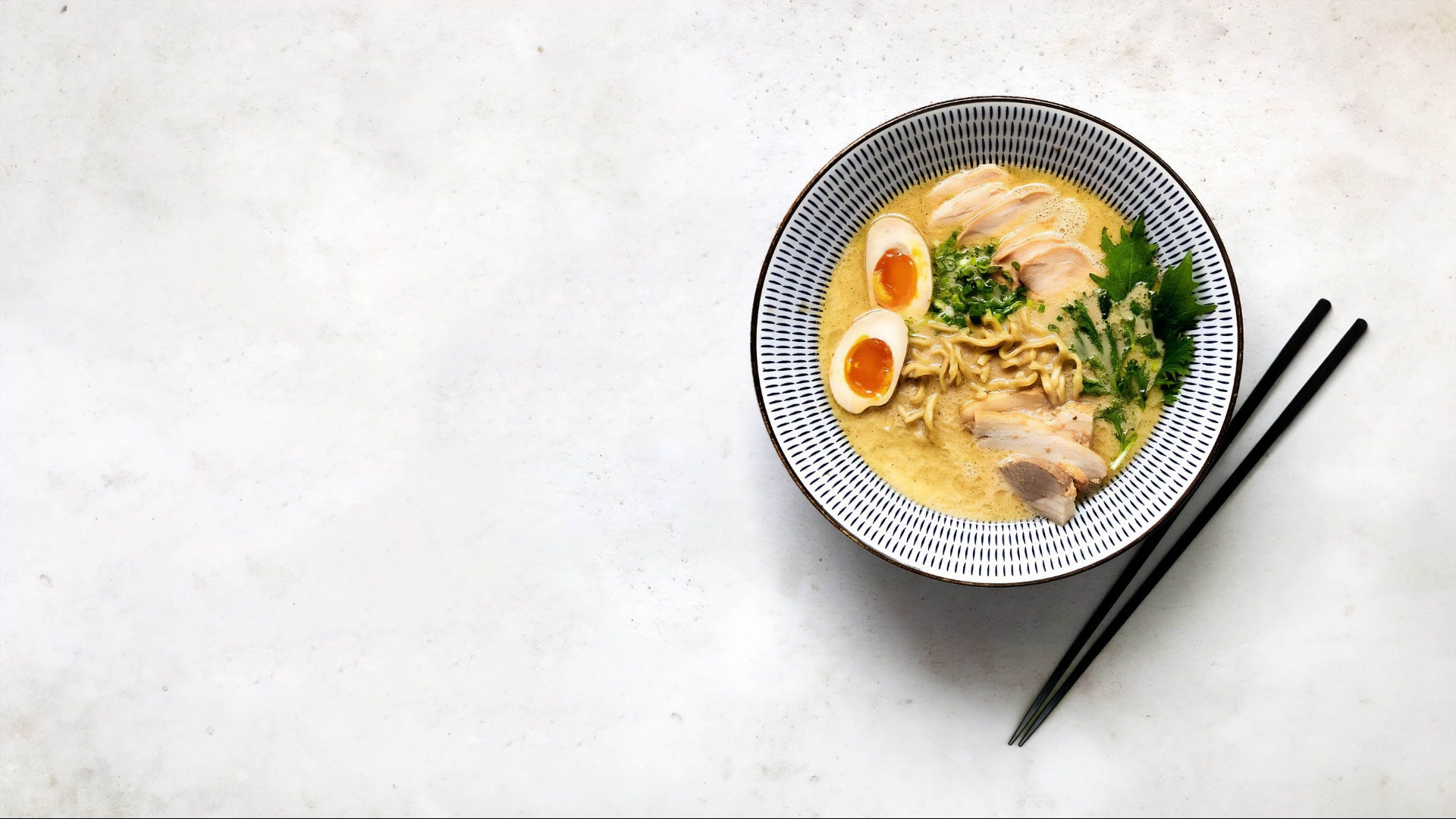Chef Kavan Kuttappa still remembers his first bowl of ramen, a “steaming hot, spicy pork tonkotsu at a hole-in-the-wall joint in New York’s Lower East Side.” That was over a decade ago, but it wasn’t until May of 2018 that the Culinary Institute of America alum seasoned his love for this dish. Kuttappa was in Osaka, Japan, for an appointment with famed tattoo artist Nissaco, whose waitlist typically runs three years. He came back from the trip with a wabori tattoo sleeve on his left arm—one that includes motifs of sake, umeboshi and yuzu—and a whole lot of memories of ramen. “I ate more than 30 bowls during that 20-day trip,” he recalls. He was also partial to Uncle Rikuro’s cheesecakes—which may well be the “fluffiest in the world. I ate them at every train station,” he admits.
It’s been nearly two years since Kuttappa opened the wildly popular Naru Noodle Bar in Bengaluru, which serves casual Japanese fast food. And now, after several months of trials with pastry maven Aarohi Sanghavi, owner of Mäki Pâtisserie, Naru’s own version of that airy cheesecake has also finally made it to the menu.

But for the rest of the city, that slice of heaven is as elusive as ever. For gastronomes in Bengaluru, the Sunday Scaries aren’t about the anxieties of the looming work week or the traffic ahead. It’s about clinching one of the limited seats within the specific shifts at this noodle bar. On Mondays at 8 pm, the online reservation link for this pandemic pop-up turned permanent ramen joint opens, and in less than 90 seconds, its 400 covers for the whole week are booked. “I’m constantly being accused of rigging the system because diners have had to try for months before being successful. But it isn’t rigged,” Kuttappa assures us. “It’s always been the fastest finger first.” After two failed attempts and a furious blur that counts as the third (the ordeal lasts over a month), I manage to wangle a booking for two.
When we get there for the second shift of dinner service, Naru is buzzing. Since our last win in the ramen lottery, last December, the room has expanded. Inspired by minkas, or light-wood Japanese houses, the noodle bar is warmed by the glow of paper lamps, subtly upholstered in indigo shibori cloth and dotted with tiny knick-knacks from Kuttappa’s trips to Japan. The room has grown from an eight-seater to include three more tables for groups of four each. Tonight, they’re occupied by gangs of glamorous ladies who are swapping gossip and speculating what the glaze on their fried avocado temaki tacos might be (it’s honey wasabi).
We post up in Naru’s original section along the bronze-speckled white marble bar, facing the suave, tattooed chef and his spotless, tightly run kitchen. Dividing these two spaces—bar and table-seating options—and lit like an art installation is a Yamato Noodle Machine, “which allows us to make 100 portions of noodles in an hour.” But during the course of a week, Naru serves just about 500 bowls of ramen. Kuttappa says this machine was selected not for its efficiency, but “for the elasticity and springiness it lends our wheat noodles”.

He has also expanded his menu from four traditional “OG” ramens, three starters, and a dessert of the day. Now, there’s the cheesecake plus a host of new appetisers and more vegetarian ramen options—including, we are assured, a “perfected shiitake mushroom broth”. Popular hits from the days of the pandemic pop-up, like the Naati Tori Paitan (his experiment with his “mom’s green masala chicken curry”) and Choriz Tantamen (a ramen flavoured with the smoky, spicy, sharp Goan choriz) have made it to the permanent menu. This cultural crossing may seem sacrilegious to the uninitiated, but he explains that ramen has always been about experimentation. “Ramen is a Japanese noodle dish of Chinese origin, and it is even written in Katakana, the Japanese script reserved for foreign words and names, so it has no hard and fast rules, unlike other Japanese dishes.” These days, he adds, people in Japan even add soft-serve ice cream to their ramen. “It’s done to temper the spice and transform the creaminess of the broth base.”
Chatty and charming, Kuttappa moves easily between the stoves and service section of the noodle bar. We were going to start off with our favourites among the OG appetisers—crispy chicken karaage, pillowy pork gyozas, and some salty-sweet edamame—but he convinces us to switch tracks. So we order the temaki tacos (fried avocado and unagi), a plate of aburi salmon, and a creamy wakame salad drizzled with bonito flakes. The tacos are handmade rolls served like open tacos—the fried avocado one is lush and lively, reminiscent of spicy pieces of pork fat, and the unagi, flown in on the daily from Kumamoto in Japan, is a smoky, singed, sinful delight. We could have eaten a dozen more. Our torched salmon was citrusy, salty from the cured roe, and a delicious tangle of textures well supported by the beads of rice crisps.
Inspired by minkas, or light-wood Japanese houses, the noodle bar is warmed by the glow of paper lamps, subtly upholstered in indigo shibori cloth and dotted with tiny knick-knacks from Kuttappa’s trips to Japan.
Now for the leads—our bowls of ramen. As a throwback, we get the Naati Tori Paitan, and it immediately transports us back to our own Sunday family lunches; evoking fondness and familiarity with a seductive appeal that has us endlessly scooping and slurping. Kuttappa encouragingly reminds us, “Ramen is best enjoyed in under eight minutes.” Our second ramen, the Sapporo Style Miso, is a more traditional choice. Its punchy funk of fermented miso and smoke from the wok-tossed noodles pair winningly with the slivers of savoury chashu pork swimming in the broth.
And then comes the much-discussed, freshly-baked-before-each-service cheesecake crowned with a berry compote. Our forks disappear into it and each bite is decadent, divine air. “It was all about getting the eggs right for the fluffiness—strong yolks that bind without being heavy,” Sanghavi tells me later over the phone. She’s not wrong there; the velvety confection is so deceptively light that we have to stop ourselves from ordering the whole cake. Satiated, we stroll out, energised to try our luck again in next week’s lottery.
Meal for two: ₹2,500 without alcohol
Timings: Wednesday-Sunday, 12:30 pm & 2:30 pm; 6:30 pm & 8:30 pm. All reservations to be booked online here
Address: Ground Floor, Courtyard, 105, Kengal Hanumanthaiah Road, opposite Corporation Bank, Shanti Nagar, Bengaluru. Wheelchair accessible







